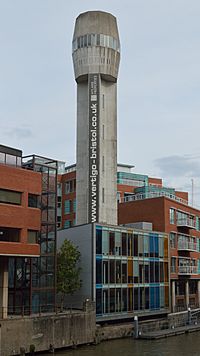Cheese Lane Shot Tower facts for kids
Quick facts for kids Cheese Lane Shot Tower |
|
|---|---|

The tower and office development
|
|
| General information | |
| Type | Shot tower |
| Location | Bristol, England |
| Coordinates | 51°27′13″N 2°35′09″W / 51.453720°N 2.585744°W |
| Completed | 1969 |
| Height | 142 feet (43 m) |
The Cheese Lane Shot Tower is a special tall building in Bristol, England. It was built in 1969. This tower was used to make small metal balls called lead shot. These were used for things like hunting or fishing weights.
Today, the tower is part of an office building called Vertigo. It stands on the north side of the Floating Harbour. You cannot go inside the tower, but it is an important Grade II listed structure. This means it is protected because of its history and design.
Contents
History of the Shot Tower
The First Shot Tower
The very first shot tower was built in 1782. It was located in the Redcliffe area of Bristol. A man named William Watts invented the idea of making lead shot this way. His invention was a big deal! Many similar towers were built around the world after his.
The original tower was used by different companies over the years. In 1868, the Sheldon Bush and Patent Shot Company Limited took it over. It kept making lead shot until 1968. Sadly, the first tower was pulled down to make way for a new road.
Building the Current Tower
The tower you see today was built to replace the old one. It was designed by a company called E.N. Underwood and Partners. They built it for the Sheldon Bush and Patent Shot Company Limited. The new tower is about 500 yards (457 meters) from where the first one stood.
This tower was finished in 1969. It is made of strong reinforced concrete. The top part, where the lead was melted, has twelve sides. This gives the tower a unique shape, like a giant cotton bud. It is one of the last shot towers ever built. It is also one of only a few built in the 20th century. In fact, it is one of only three left in England! The tower even won an award in 1969 from the Bristol Civic Society for its design.
How Shot Towers Worked
The Cheese Lane Shot Tower is 142 feet (43 meters) tall. The lead shot would drop about 120 feet (36 meters) inside. At the very top of the tower was a room called the crucible room. This room was 24 feet (7.3 meters) wide. Inside, there was a large cauldron. This cauldron used gas to melt blocks of lead.
Workers would take the melted lead and drop it through a special screen. As the tiny drops of molten lead fell through the air, they would cool down. They would form into perfect little round balls. At the bottom of the tower, the lead balls would land in a tank of cooling water. A conveyor belt would then move the finished shot to another building for processing. An elevator and stairs helped workers and lead blocks get to the top.
The Tower Today
Over time, people became worried about lead harming the environment. Also, new ways of making shot were invented, like the Bliemeister method. Because of this, the Cheese Lane Shot Tower stopped making lead shot in the late 1980s. The whole factory site closed in 1994.
At first, there were plans to pull down the tower. But in 1995, it was saved! English Heritage, a group that protects historic places, made it a Grade II listed building. This meant it had to be preserved.
Later, plans were made to include the tower in a new office building. This happened in 2005, when the tower became the center of the Vertigo office development. The tower has been fully updated. The top level can even be rented out as a meeting room.
Images for kids
 | Victor J. Glover |
 | Yvonne Cagle |
 | Jeanette Epps |
 | Bernard A. Harris Jr. |



